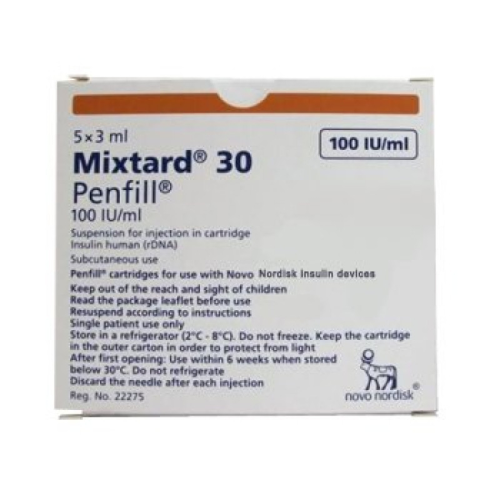Mixtard 30 Penfill 100 IU
- Brand: Novo Nordisk
- Product Code: Mixtard 30 Penfill 100 IU
- Availability: In Stock
-
$95.00
CLASSIFICATION
Hormone and Synthetic Substitute / Antidiabetic Agent
ACNE
No
WATER RETENTION
No
HBR
No
HEPATOTOXICITY
No
AROMATIZATION
No
MANUFACTURER
Novo Nordisk
WAREHOUSE
International Warehouse 2
SUBSTANCE
Human Insulin
,
Insulin Isophane
,
Insulin is a potent anabolic hormone produced by all humans, playing a crucial role in maintaining bodily functions. While the body naturally generates insulin, individuals with diabetes often require its external administration. Some athletes also use it to promote lean muscle growth, although off-label use carries significant risks and should be approached with extreme caution.
The exogenous use of insulin dates back to the 1920s, when it was extracted from the pancreases of dogs, and later from cattle and pigs, rather than being synthesized. Despite concerns over purity, the life-saving potential of exogenous insulin was widely acknowledged, as untreated diabetes can result in fatal outcomes. By the 1970s, purity concerns had largely been addressed, leading to the introduction of synthetic insulin by Ciba in 1975. This was refined further in 1982 with the launch of Humulin-R, a form of insulin that closely mimics human insulin and received FDA approval.
Insulin Functions & Traits:Produced by the pancreas, insulin is classified as a peptide hormone. Its primary functions include overseeing the utilization and regulation of glucose, amino acids, and fatty acids, while also inhibiting the breakdown of glycogen, fat, and protein.
Diabetes can necessitate insulin for two distinct types: Type I diabetes, characterized by insufficient insulin production; and Type II diabetes, where insulin is produced but not effectively utilized by the body's cells, often exacerbated by obesity.
Insulin positively influences liver function by promoting glycogen formation from glucose and inhibiting the conversion of non-carbohydrates into glucose. It facilitates the uptake of glucose by cells, which can encourage muscle growth. Elevated insulin levels are also associated with enhanced protein synthesis, increased bone density, and heightened production of Insulin-Like Growth Factor-1 (IGF-1), another anabolic hormone with structural similarities to insulin.
Additionally, insulin can stimulate the production of Luteinizing Hormone (LH) and Follicle Stimulating Hormone (FSH), which may indirectly lead to increased testosterone production in the body, although this effect is not particularly strong.
Effects of Insulin:Insulin’s primary effect across both types of diabetes involves blood sugar regulation. Its anabolic and anti-catabolic properties can be advantageous for athletes, but the off-label use of insulin by non-diabetics can lead to significant fat gain and potentially fatal consequences if not managed correctly.
While some athletes find the anabolic effects of insulin appealing, it is essential to manage body fat due to its metabolic impact. When insulin levels rise, the body’s ability to burn fat diminishes, necessitating a carefully controlled diet. Users must monitor caloric and fat intake to ensure that glucose and protein are stored in muscle rather than fat tissue. To maximize the anabolic effects, insulin should ideally be administered immediately following intense weight training and should be accompanied by food.
With proper management, insulin can promote considerable muscle growth in a short time frame. Many find it challenging to control body fat while using insulin, but achieving this balance is possible. In performance settings, using anabolic steroids alongside insulin and Human Growth Hormone (HGH) is often recommended, as it facilitates further growth and helps manage body fat levels effectively.
Side Effects of Insulin:Insulin use can lead to side effects, particularly hypoglycemia. Proper dosing usually mitigates risks for diabetic patients; however, performance scenarios carry greater risks. Hypoglycemia, characterized by low blood glucose levels, is the main side effect associated with insulin and can cause various symptoms ranging from dizziness and hunger to severe complications, including death.
Common symptoms of hypoglycemia include: - Dizziness - Hunger - Drowsiness - Blurred vision - Depression - Sweating - Rapid heart rate - Tingling sensations - Cognitive impairment - Headaches - Anxiety - Irritability - Slurred speech - Unsteady movements
If hypoglycemic symptoms arise, immediate consumption of fast-acting carbohydrates, like candy or sugary drinks, is advised. Insulin users should never go to sleep after administration and should always have someone present to help in case of emergencies, as severe hypoglycemia may lead to complications like diabetic coma.
In addition to hypoglycemia, side effects can include allergic reactions at the injection site, resulting in swelling, itching, or irritation, and it is rare but possible to experience more severe reactions such as rash or difficulty breathing. The localized accumulation of fat in areas of repeated injections is another concern, leading to recommendations to rotate injection sites.
Insulin Administration:For diabetes management, insulin doses are highly individualized. Performance enhancement dosages vary with the type of insulin used, and a commonly suggested dose for athletes is 1 IU per 10 pounds of body weight. First-time users should start with a lower dose, gradually adjusting until a comfortable level is found.
The optimal time for insulin administration is immediately after weight training, followed by a significant intake of carbohydrates (at least 100 grams) and some protein (around 40–50 grams). Users must also keep rapid-acting carbohydrates available to counter any hypoglycemic symptoms.
Insulin Reviews:Insulin is a vital hormone for health and proper bodily function and can significantly aid muscle development when used for performance enhancement. However, its use poses risks, especially concerning the challenges of managing body fat. Many individuals may find they can achieve their fitness goals without it and might maintain better long-term health by avoiding its use. Despite its appeal in competitive bodybuilding and among some athletes, it is essential to approach insulin with caution, particularly for those who are not genetically predisposed to handle such substances effectively.

